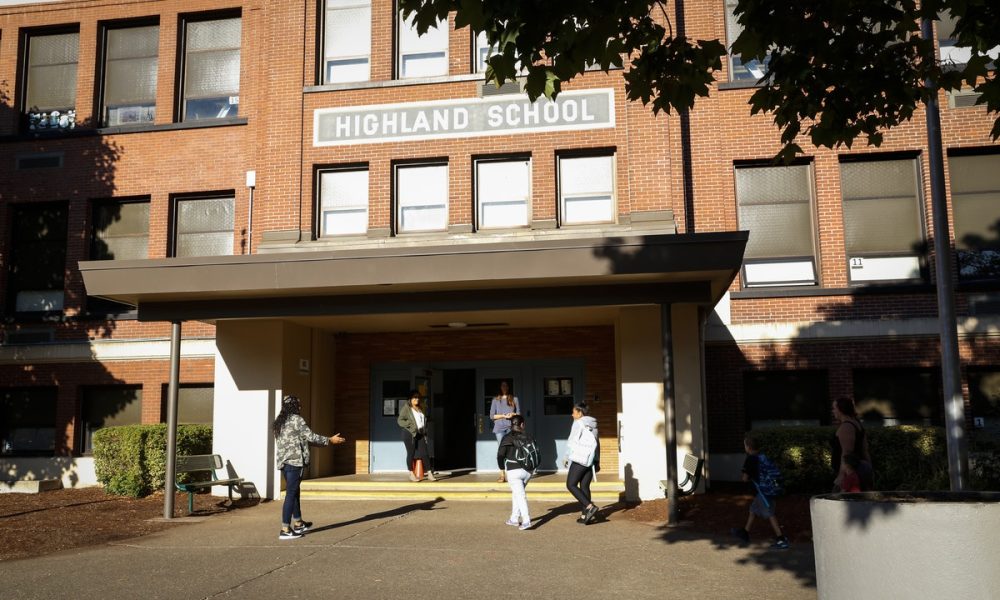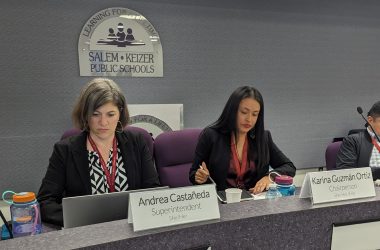
Students enter Highland Elementary on Friday, Sept. 7. (Special to Salem Reporter/Moriah Ratner)
The Salem-Keizer School Board Tuesday night renewed a resolution supporting “safe and welcoming schools” but declined to take a public position on a more controversial Oregon ballot measure that would repeal the state’s so-called sanctuary law.
Tuesday’s meeting was packed with community members, about a dozen of whom urged the board to publicly oppose Measure 105.
Many who spoke were current or former Salem-Keizer School District students who said the measure would lead to racial profiling of Latino and immigrant families.
“Measure 105 is meant to hurt us,” said Tony Villaneda, a sophomore at North Salem High School. “When 52 percent of youth in the district are of color, it is your duty to speak up for what is right.”
Currently, Oregon law forbids all state agencies, including law enforcement, from using resources to find or apprehend people violating federal immigration laws. If Measure 105 passes, that law would be repealed.
The repeal would not require local police to enforce federal laws.
Police Chief Jerry Moore and Marion County Sheriff Jason Myers both said interviews with the Salem Reporter that the measure wouldn’t change how they operate, and their staff would not begin enforcing federal immigration laws.
District policy states immigration officials can’t remove a student from school without a warrant, which would not change if Measure 105 passes. It’s one of several district policies that support staff and board goals of safe and welcoming schools for all students, spokeswoman Lillian Govus said.
But several students said those policies did little to alleviate fears about their parents.
“Lately I’ve been having nightmares where my dad is deported and so am I,” said Itzel Ibarra, who graduated from McKay High School in June. “I don’t think that’s healthy. And I don’t think that’s what you want your students to feel like, knowing that their parents are immigrants and they don’t have papers.”
Ibarra’s parents brought her to the U.S. from Michoacán, Mexico, when she was 2. Her father is undocumented and the sole caretaker for her and her autistic brother, she said.
She said she understands schools aren’t supposed to wade into politics, but felt the board had an obligation to speak up about issues impacting students.
“It stops being politics when it starts affecting our lives,” she said.
Board members thanked students and community members who testified, but said they were not planning to take a position on the measure. Many who testified murmured their disapproval before walking out of the meeting.
Sheronne Blasi, school board vice chairwoman, said she brought up the idea of a board resolution opposing the measure at a work session two weeks ago, but opted not to introduce one after a majority of board members said they didn’t feel it was the board’s place to take a public stance on ballot measures.
Blasi said after the meeting that she’s personally opposed to the measure.
“It has the potential to negatively impact a portion of the student body,” she said.
Board chair Kathy Goss said the safe and welcoming schools resolution shows the board’s support for educating all students, regardless of their race, nationality or immigration status. She doesn’t think the board should wade into politics.
“We’re here to educate kids,” she said.
Asked if the testimony at the meeting had changed her thoughts, she said, “We’re all empathetic to what they’re going through. There’s no question about that.”
Board member Marty Heyen, who represents the district that includes McKay High School and is a Republican seeking a seat in the Oregon House, said she hasn’t read Measure 105 yet and doesn’t have an opinion on the ballot measure.
“I don’t decide to do things based on emotion,” Heyen said. She said the district policy of requiring immigration officials to have a warrant before they’re allowed in schools reflects the district’s commitment to keeping students safe.
Superintendent Christy Perry, who was at the meeting, said she’s not able to take a public position on a ballot measure because she is a nonpartisan public official.
Oregon law prohibits public employees from supporting or opposing ballot measures or candidates during work hours, or while acting “in an official capacity.” That includes superintendents who are at school board meetings.
“When our kids speak, I’m always proud of them,” she said. “We should listen to our community.”
Have a story tip? Contact reporter Rachel Alexander: [email protected] or 503-575-1241









